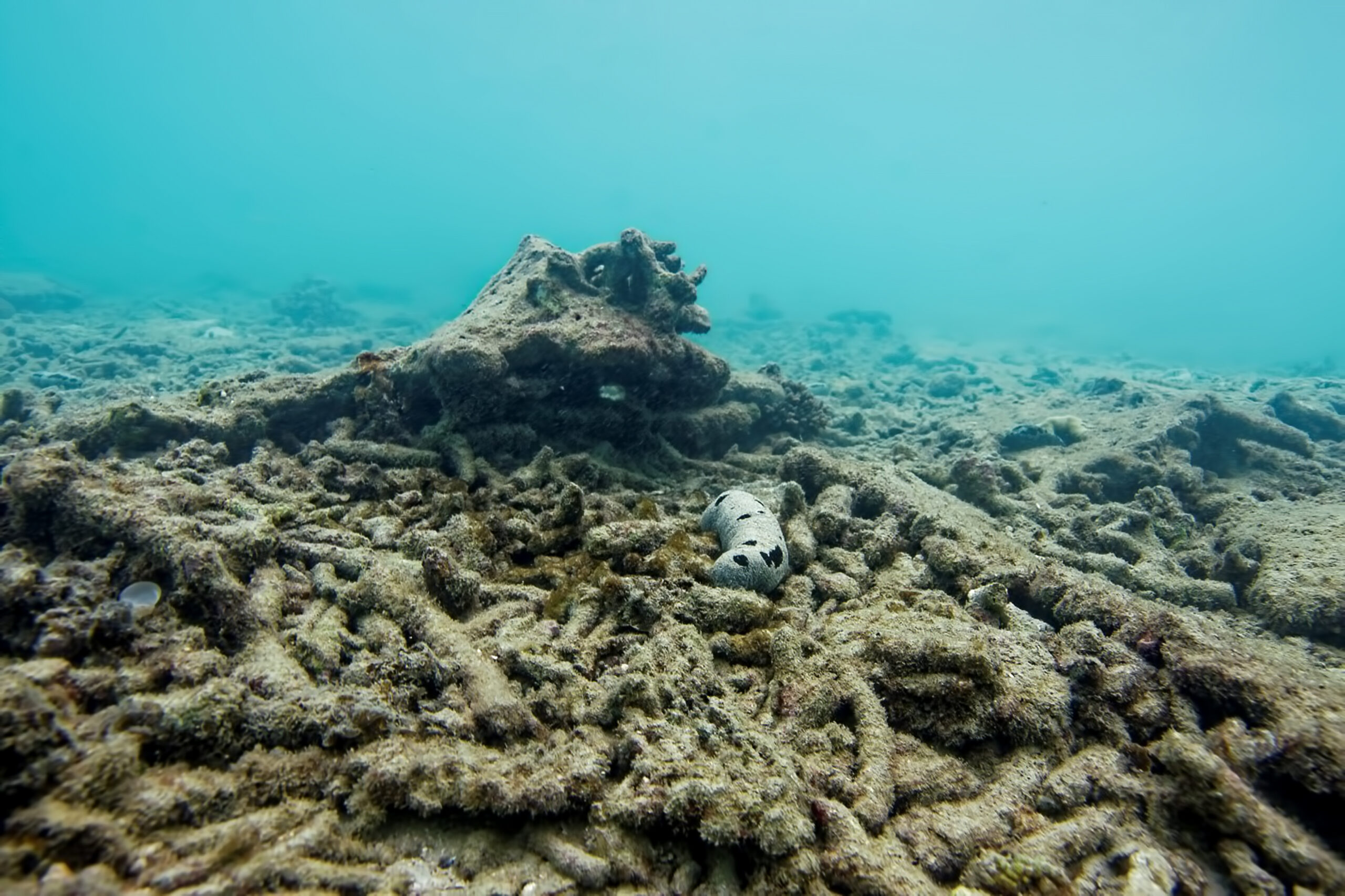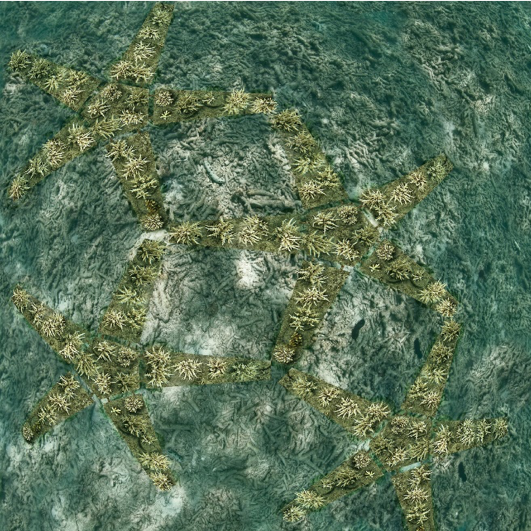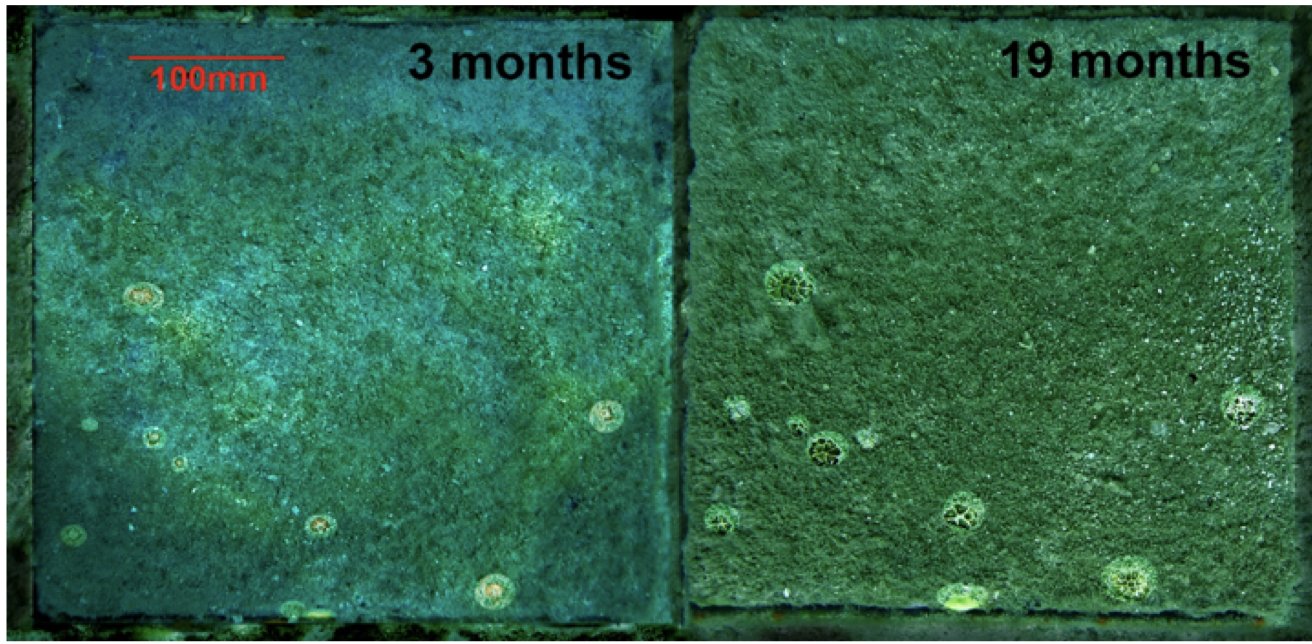Coral Stars for Reef Rehabilitation

Anne-Mette Jørgensen & Gerald Goeden
Fizzy Transition Ventures’ reef rehabilitation work began in earnest at Langkawi, Malaysia in 2010. The aim was to assist natural recovery of coral reefs following the 2004 Tsunami. We went on to develop an experimental coral nursery in 2018 at Perhentian Marine Park where expansive reef tracts have been destroyed by “dynamite fishing”. The damage here is characteristic of other areas denuded of living coral, with virtually all stable substrate destroyed (see photo below).

Our Perhentian surveys were conducted more than 10 years after the destruction. They indicated that there had been no useful natural recolonization, and the substrate was too unstable to allow successful transplanting using popular methods.
To overcome these problems, we developed 'Coral Stars' and a small coral- fragment nursery capable of producing 2,000 to 3,000 transplants annually. At a density of 2.5 colonies/m2, available staff have planned to rehabilitate 1000m2 per year. This project was scaled to the budget and staff availability of the local resort that is supporting the work. The 'Coral Stars' have been produced and the small transplants were ready when Covid-19 brought a halt to the project.
What are Coral Stars?
Coral Stars are proprietary structures (patent applied for 2019) that are star-like in plan- view (see photo below).

They may have arms radiating from a central disc or comprise a regular matrix of interlinked arms without central discs. The specific layout depends on engineering requirements, coral species chosen, as well as short and long term goals for the project. Where additional fish shelter is required (common in dynamite fished areas), the central disc can be replaced with a specially designed artificial reef module.
The unique properties of Coral Stars make them particularly suitable for large-scale reef restoration. They are easy to assemble by divers or can be assembled onshore and launched with machinery. Time consuming ‘planting’ is avoided since transplants are easily moved from nursery to site and any coral mortalities are quickly replaceable.
Coral Stars are flexible and so conform to the terrain profile. They are made of a proprietary laminate called SynCoral. SynCoral is a “super-diversity” material with a very low carbon footprint and functional life of over 100 years. SynCoral greatly increases macroscopic life surrounding the coral transplants and thus improves food supply to small resident fishes and many coral species.
Where there is good larval connectivity with undamaged coral communities, Coral Stars will actually attract planulae for natural recolonization.
Materials testing at Perhentian Marine Park showed settlement of 64 corals/m2 on our proprietary surfaces compared to 10 corals/m2 on a natural coral rock surface and 0 corals/m2 on Portland cement over a 19-month period.

When to use Coral Stars?
Due to their flexible design, Coral Stars are particularly suited to large rehabilitation projects by offering the following advantages:
- Large tracts of destroyed reef can be quickly stabilized and “replanted” with corals from a small on-site coral nursery.
- Where near-shore coral development has been lost, beach erosion can be mitigated or reversed while corals are reestablished. Coral Stars are effective in many areas subjected to annual monsoon weather.
- New coral areas can be established in cooler habitats allowing the expansion of coral covered habitats and providing possible refugia against coral bleaching.
Transplanted corals lost through future bleaching or other causes may be quickly replaced. This is of considerable benefit in areas deriving income from coral viewing but facing the possibility of future bleaching or typhoon damage.
The rehabilitation work can easily be up- scaled and the installation does not require highly skilled personnel.
Developing a Rehabilitation Project with Coral Stars
Following a site survey, our project planning software assists in defining requirements and suggests a layout. Coral Stars can be designed and manufactured in a variety of sizes and shapes to meet the site’s hydro- dynamic requirements. Designing takes into consideration available labor, equipment, time scale, and budget. Coral nurseries are developed to suit local needs and staffed by locals trained by our team. Projects may run over several years and can be monitored and reported on by Fizzy Transition Ventures.
So, if you want to restore large tracts of destroyed reef, combine coastal protection with coral reef restoration or develop a compensatory coral reef in a new location, because traditional reef locations are no longer suitable for coral survival: let us know. Together, we can develop a plan that suits your purposes and limitations.
Would you like to know more about our initiatives? Feel free to contact us
Address Leonard Springerlaan 35 9727KB Groningen
The Netherlands
info@fizzytransition.com
© 2021 Fizzy Transition Ventures B.V.